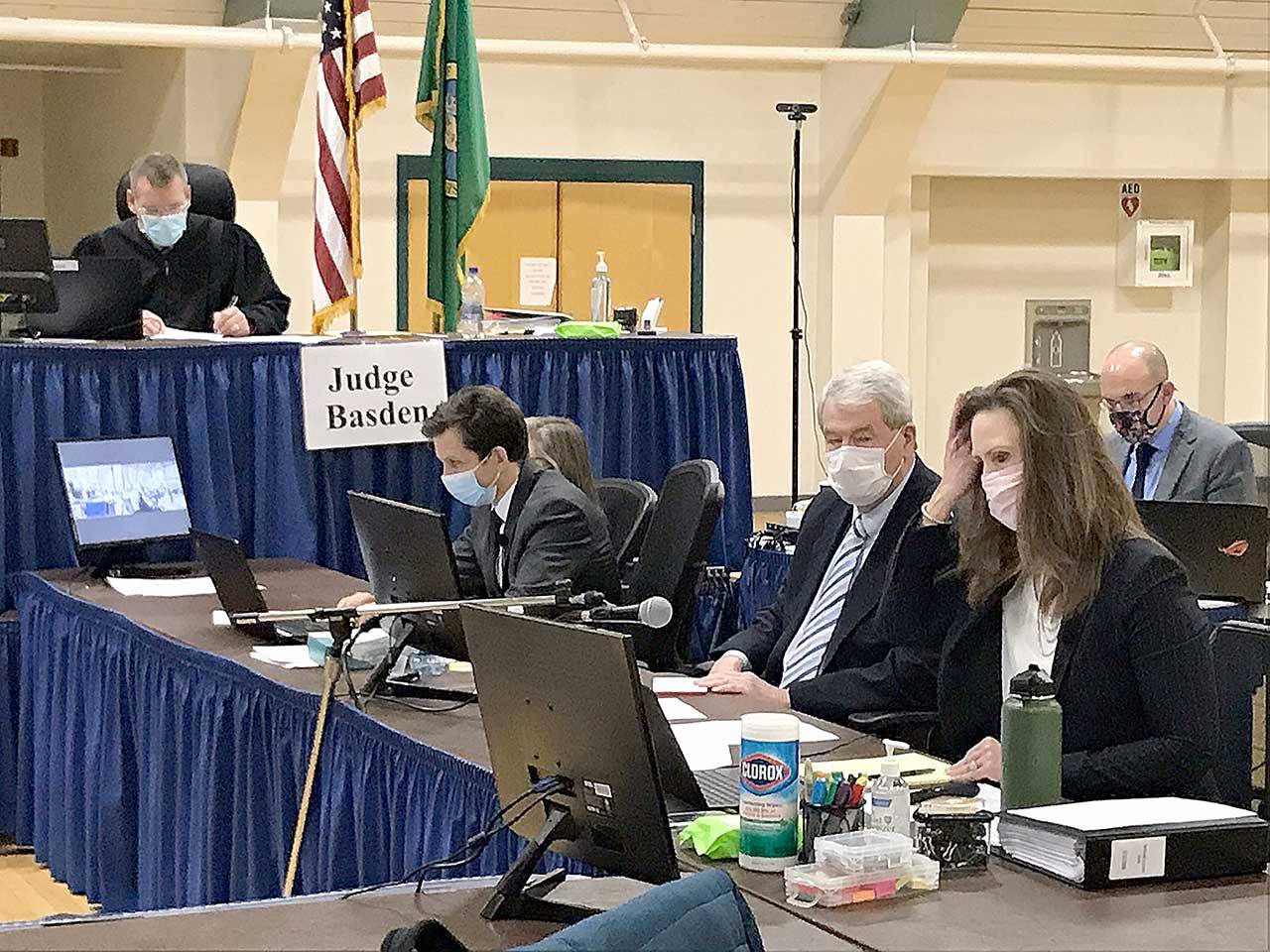PORT ANGELES — After three weeks of testimony, a jury last week took fewer than 43 minutes to reject a lawsuit by a Clallam County man seeking $10.3 million in damages after receiving medical care.
Erin Brown had sought the award in a civil claim alleging he was treated in a negligent manner for his medical condition and alcoholism at Olympic Medical Center, leading to a seizure and a serious brain injury.
The jury, which was selected beginning Nov. 11, rendered its verdict late Thursday afternoon following the longest Superior Court jury trial this year.
The jurors departed the Vern Burton Community Center gym, where the trial was held in spread-out fashion to guard against COVID-19, at 3:28 p.m. Thursday.
Judge Brent Basden offered them the option of returning Friday if need be, but the jury rendered a decision at 4:12 p.m.
Brown was seeking $10.3 million in past and future economic and non-economic damages in a complaint for medical negligence against OMC Hospital District 2 and other defendants.
They included certified Physician Assistant J. Charles Speed, now retired; the emergency-room services provider Peninsula Emergency Services Inc., which was contracted with OMC and employed Speed, and 10 unnamed plaintiffs referred to in the complaint as “Jane and John Does.”
Two were identified as nurses by lawyer Keith Bruno, representing Brown, who also was represented by the Seattle medical malpractice law office, The Lee Tucker Law Firm.
The nurses were employed by OMC.
Brown had alleged in his lawsuit, filed Feb. 6, 2018, that negligence in his care occurred between Feb. 10, 2016, when he went to OMC’s emergency room for help with his excessive alcohol use, and May 19, 2016, when he visited the emergency room again.
“Steed failed to follow the applicable standard of care that was the proximate cause” of the injury, Bruno said.
“A medical provider has a duty to the patient.”
Brown’s history of alcohol withdrawal seizures was documented Feb. 10, 2016, but not on his May 19, 2016, visit, when just his high alcohol use was documented, according to the complaint.
“Mr. Brown should have been admitted to an inpatient medical unit and withdrawn from alcohol under close medical supervision to prevent the occurrence of seizures,” it said.
“Because no history of withdrawal seizures was obtained or documented on May 19, 2016, defendants entered an outpatient prescription chlordiazepoxide and apparently sent Mr. Brown to undergo withdrawal at a rehabilitation facility where intensive medical supervision was not available.
“Mr. Brown did subsequently suffer a generalized withdrawal seizures with loss of consciousness and a fall resulting in severe traumatic brain injury that has left him seriously and permanently disabled.”
The defendants failed to identify, evaluate, diagnose, manage and treat Brown’s alcohol and medical condition, the complaint alleged.
“Defendants’ medical errors caused Mr. Brown’s brain injury,” according to the complaint.
Bruno listed damages as past economic damages, $57,960; future economic damages, $715,105; past general economic damages, $4 million, and future non-economic damages, including for “a brain injury of this magnitude,” of $5 million.
Malpractice attorney Michele Atkins of Seattle, representing Speed, said medical providers had given Brown a sufficient standard of care and were not responsible for the injuries he sustained after he left the emergency room.
She said Specialty Services was adequately trained to detect alcohol withdrawal symptoms and acted accordingly.
“A medical provider cannot guarantee that a patient will leave the hospital, the doctor’s office, the emergency department, and not experience risk, and not experience that outcome,” Atkins said.
She said testimony showed, for example, that patients with congestive heart failure and a history of heart attacks are discharged from the hospital even though doctors know they are at risk of having a heart attack.
“Why is that the standard of care? Because our job is to treat the medical conditions [and] discharge them to follow up with care on an outpatient basis,” she said.
“Withdrawing from alcohol is a serious situation. There is risk associated with that, no doubt about it. But we heard from multiple witnesses that the potential, the potential for risk, is not, cannot mean a reason to keep a patient in the hospital.”
She referred to a jury instruction that said a poor medical result is not, by itself, evidence of negligence.
“The job of the health care provider is not to guarantee that nothing bad will ever happen to their patient,” Atkins said.
“You don’t get to take the outcome, and turn it into the standard of care,” she said.
“So when Mr. Bruno says, well, didn’t he have a seizure just a few hours later, what I think he’s trying to conflate is the outcome with what the standard of care requires.”
She said Brown was responsible for his condition.
“He chose not to take the support and tools and the resources to help himself,” she said.
“But I don’t think he gets to come here and ask you for money, millions of dollars of money, for the result of [those] choices.”
________
Senior Staff Writer Paul Gottlieb can be reached at 360-452-2345, ext. 55650, or at pgottlieb@peninsuladailynews.com.

